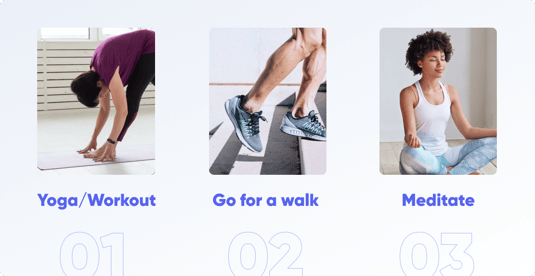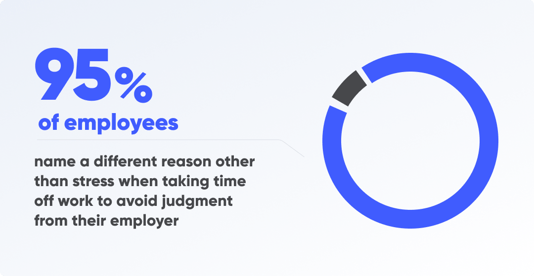Whether you are stressed out about a specific task or simply feel overwhelmed by your never-ending to-do list, you may find yourself experiencing waves of work-related anxiety. Long-term anxiety can lead to the development of mental health issues, a drop in productivity and motivation, and a significant negative impact on individuals and companies as a whole.
Research shows that 83% of workers suffer from work-related stress, resulting in $190 billion spent on annual healthcare costs. These alarming statistics clearly indicate the magnitude of how major of an issue work-related anxiety is in the United States.
Whether you're a company leader aiming to encourage wellness throughout your company, or an individual employee looking to reduce work-related stress—this article is for you.
10 Mindfulness Methods for the Workplace
1) Practice Self-Care
Self-care is so much more than just a trendy narrative. The importance of nutrition, sleep, relaxing, restorative rest, and physical movement is relevant now more than ever. Practicing self-care looks different for everyone. It can be in the form of comforting yourself, such as watching a feel-good movie, treating yourself to a massage, or simply drinking enough water throughout the day.
It can be difficult to prioritize taking care of yourself, especially in a highly demanding job. However, bringing attention to your own mind and body will benefit your health, decrease your stress levels, and play a huge role in your overall wellbeing. Chances are that your coworkers may be putting off their self-care as well. If your company offers a wellness program, take advantage of it and invite them to join you for a class!
2) Take A Break
Have you ever felt stuck with a task, decided to take a break, and gained a sudden creative breakthrough when you came back to that same task at a different time? That is the power of incorporating strategic breaks into your workday. Stepping away from your busy workload may be one of the most beneficial things you can do for your productivity.
If you’re playing tug-of-war with anxiety, it’s best to walk away rather than to be pulled too far in one direction and reach the end of your rope. A good way to reduce stress is through practicing mindfulness meditation. By focusing on the present moment, you immerse yourself into a new state of mind that will help reduce your anxiety.
3) Try Progressive Muscle Relaxation
A common way that our bodies respond to anxiety is through muscle tension. Progressive Muscle Relaxation is a technique that was developed in the 1930s by an American physician named Edmund Jacobson. Studies show that practicing this technique can help relieve tension in your body and give you a greater sense of control over your anxiety symptoms.
To perform it:
-
Breathe in, and tense the first muscle group (hard but not to the point of pain or cramping) for 4 to 10 seconds.
-
Breathe out, and suddenly and completely relax the muscle group (do not relax it gradually).
-
Relax for 10 to 20 seconds before you work on the next muscle group. Notice the difference between how the muscles feel when they are tense and how they feel when they are relaxed.
-
When you are finished with all of the muscle groups, count backward from 5 to 1 to bring your focus back to the present.
Through continuous practice, your mind and body will naturally adapt to the rhythm of this method. In time, you will be able to easily use this technique whenever you experience work-related anxiety.
4) Find What Feels Good
Depending on the situation, different solutions may be needed to help reduce your anxiety. What works one day may not be what’s best the next time. To combat this, come up with a list of at least three activities that you find helpful during a stressful situation.

For example, your list may include yoga, breathing exercises, going for a walk, or having a conversation with someone you can confide in. Take the initiative to introduce a 5-minute mindfulness session into your workday and encourage your team to participate!
5) Share Your Feelings
You may find yourself questioning whether or not you’re alone in experiencing work-related anxiety. Sharing your feelings with your coworkers or manager is not typically the first choice for most people. However, doing so will help you process your thoughts, provide support and understanding, and even validate your emotions.
Anxiety tends to feed off your thoughts, which only fuels your overwhelm. By verbalizing your feelings, you can actually help your mind slow down while allowing it to release damaging thought patterns. If you’re feeling overwhelmed by the needs of a specific project, try talking it out with your manager or coworkers. They may be able to ease some of your stress, forecast project plans, or even help you accomplish and finalize some of those looming tasks.
6) Connect With Your Team
Along with verbally outsourcing your overwhelm to coworkers, it’s important to connect with your team on a deeper level than just work. Social support is crucial for stress management. In fact, a simple conversation with others can do far more good than you may think.
If you’ve taken a group fitness class before, you know that you may end up with three new friends by the end of the class. The power of connection is incredibly strong and healing, especially through an activity that is physically, mentally, and emotionally engaging.
Team-building exercises are a great way for your team to bond together. A wellness program is a great opportunity to empower your employees to prioritize team wellness within your organization. It’s important to nurture interpersonal connections that expand beyond just the topic of work!
 7) Take Time Off
7) Take Time Off
There is usually no hesitation to take time off when you are feeling sick. However, when it comes to mental health, it’s a different situation. Studies show that 95% of employees say that they are taking time off due to not feeling well. In reality, they may actually be taking the time off due to stress.
It’s safe to assume that either you or someone you know has done this as well. Even if you don’t feel comfortable sharing your work-related anxiety with your employer, it’s important to still take time off for yourself and allow your mind to recharge away from the workplace. Even half a day off could do wonders!
8) Practice Time Management
Gain back control of your schedule by adopting these proven time management techniques for managing anxiety and stress. Planning out your week, learning to say no, and creating boundaries are all tactics that play a role in your overall well-being.
Struggling to stay on track? Grab a co-worker and plan out a strategy that works for both of you. Having a team member to support you will not only keep you focused, but will also provide some friendly and motivating workplace competition.
Ask your employees to commit to doing deep work for 2-3 hours per day! These sessions will transform their time management processes and help them make active progress on their daily workload.
9) Stick To A Healthy Routine
It may seem tempting to cancel your dinner or workout plans when the end of the day rolls around and you still feel underwater with your workload. However, continuing to push through the work and steer away from your schedule can actually increase your work-related anxiety.
Carrying out routines signals to your brain that you are still in control and can predict upcoming situations. In turn, staying on schedule and being prepared is a key factor in reducing anxiety and stress. Don’t worry — your work (unlike your anxiety) will still be there when you get back!
10) Be Kind To Yourself!
If you find yourself experiencing work-related anxiety, take a deep breath and remember that you’re not alone. Being kind to yourself may be the last thing on your mind when you are in a moment of anxiety — but instead of feeling disappointed with yourself, reframe your thoughts and think about how you would help a coworker in a similar situation.
Do your best to anchor yourself in the present moment, speak positive affirmations to your mind, and partake in a physical or mental activity that feels kind to you. You may even consider a private 1:1 session with an expert to help walk you through your particular situation.
You Are Not Your Anxiety
Despite the temptation to place blame on yourself after experiencing work-related anxiety, it’s important to remember that it does not define you. You can find a way to meet and respond to your anxiety, rather than continue to accept it with no resolution.
Workplace anxiety happens to everyone, but it’s not something that should be ignored. As a manager, you have the power and authority within your organization to implement these mindfulness tactics and encourage your employees to follow them!
Consider implementing a wellness program into your workplace, and as always, prioritize your and your team’s mental, physical, and emotional health.
.png)

.svg) Share
Share.svg) Tweet
Tweet.svg) Post
Post.svg) Mail
Mail